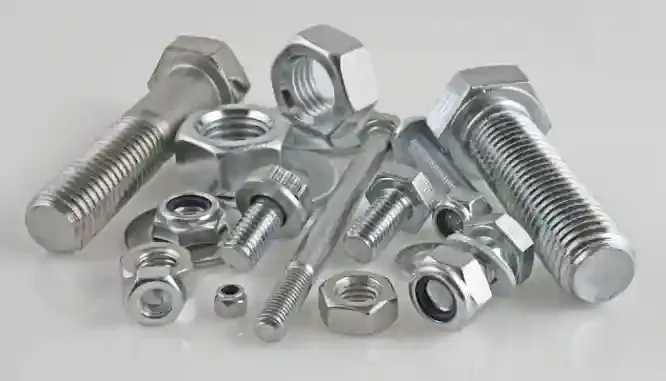Fastener nuts and bolts play a critical role in part design, manufacturing, and assembly. Mechanical fasteners can be of various types depending on their application. What factors should you consider when choosing a fastener for your DIY project?
Let's understand the different types, functions, materials, coatings and applications of fastener nuts and bolts and explore the practical use of fastener nuts and bolts in construction, manufacturing and multiple industries.
 |
| Understanding the different types of nuts and bolts |
Fastener Nuts and Bolts: Types, Functions and Applications
Fastener nuts and bolts are ubiquitous daily, serving as the unsung heroes that hold together the structures and machinery we rely on. These simple yet vital components come in various shapes and sizes, each designed for specific purposes. This article will take a closer look at fastener bolts and nuts, exploring their types, functions, materials, and applications to better understand their importance in construction, manufacturing, and various industries.
Types of Fastener Nuts and Bolts
Hex Nuts and Bolts: Hex nuts and fasteners bolts are characterised by their six-sided heads and are widely used in general construction and DIY projects.
Machine Screws: These are smaller screws with fine threads, often used in machinery and electronics.
Lag Bolts: Lag bolts are large, heavy-duty screws used for securing wood-to-wood or metal-to-wood connections.
Socket Head Cap Screws: These screws have a cylindrical head with an internal hexagonal drive, suitable for applications requiring a smooth and flush finish.
Carriage Bolts: Carriage bolts have a rounded head and a square neck, designed for use with square holes in wood.
Washers: While not screws or nuts themselves, washers are often used in conjunction with nuts and bolts to disperse load and control damage to the materials being fastened.
Functions of Fastener Nuts and Bolts
Joining: The primary function of nuts and bolts is to securely join two or more components. Whether holding steel beams in a skyscraper or attaching a doorknob to a door, screws and bolts provide the necessary connection.
Fastening: Nuts and bolts offer a quick and reliable method for connecting components. Unlike welding or adhesive bonding, they allow for disassembly and reassembly, making maintenance and repairs more manageable.
Adjustability: Nuts and bolts provide a degree of adjustability, allowing for fine-tuning during assembly. This is specifically helpful in applications where precise alignment is crucial.
Load Distribution: Using washers with nuts and bolts helps disperse the weight more evenly, lessening the risk of material deformation and improving the overall integrity of the connection.
Materials and Coatings
Steel: Steel nuts and bolts are robust, versatile, and cost-effective. They are suitable for various applications, including construction, automotive, and machinery.
Stainless Steel: Stainless steel provides exceptional resistance to corrosion, making it well-suited for applications exposed to moisture or chemicals.
Brass: Nuts and bolts made of brass are resistant to corrosion and are frequently utilised in decorative applications owing to their appealing appearance.
Aluminium: Aluminum is lightweight and corrosion-resistant, making it suitable for aerospace and automotive industries.
Applications Across Industries
Construction: Nuts and bolts are essential in the construction of buildings, bridges, and infrastructure. They hold together structural components, ensuring the stability and safety of the built environment.
Automotive: The automotive industry relies heavily on fastener nuts and bolts for assembling vehicles. Fasteners are crucial in automotive manufacturing, from engines to chassis components.
Manufacturing: Manufacturing processes often involve assembling machinery and equipment, where fastener nuts and bolts are used to secure various components.
Aerospace: In the aerospace industry, where precision and reliability are paramount, fastener nuts and bolts are crucial for assembling aircraft and spacecraft.
Electronics: Smaller fasteners, such as screws and machine screws, are used extensively in the electronics industry to assemble electronic devices and circuit boards.
Marine: Due to the corrosive nature of marine environments, stainless steel bolt fasteners are commonly used in boat and ship construction.
Conclusion
Fastener bolts and nuts may seem like small components, but they are the unsung heroes that hold together the structures, machinery, and products we depend on daily. Understanding the various types, functions, materials, coatings, and applications of fastener nuts and bolts is crucial for ensuring their practical use in construction, manufacturing, and multiple industries. Whether building a skyscraper or fixing a household item, these humble fasteners are vital in making it all possible.
